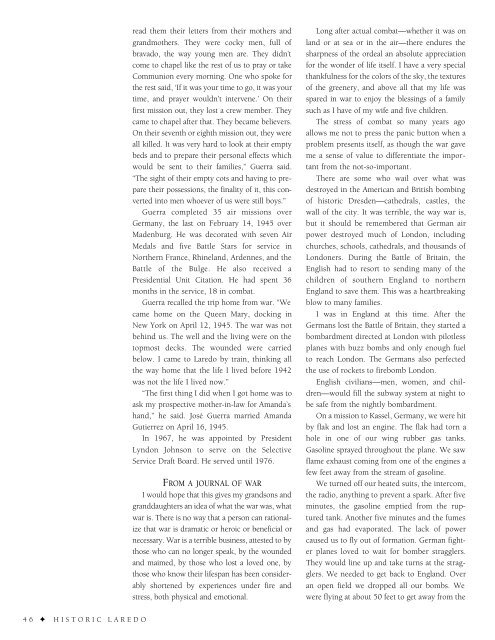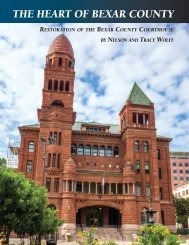Historic Laredo
An illustrated history of the city of Laredo and the Webb County area, paired with the histories of companies, families and organizations that make the region great.
An illustrated history of the city of Laredo and the Webb County area, paired with the histories of companies, families and organizations that make the region great.
You also want an ePaper? Increase the reach of your titles
YUMPU automatically turns print PDFs into web optimized ePapers that Google loves.
ead them their letters from their mothers and<br />
grandmothers. They were cocky men, full of<br />
bravado, the way young men are. They didn’t<br />
come to chapel like the rest of us to pray or take<br />
Communion every morning. One who spoke for<br />
the rest said, ‘If it was your time to go, it was your<br />
time, and prayer wouldn’t intervene.’ On their<br />
first mission out, they lost a crew member. They<br />
came to chapel after that. They became believers.<br />
On their seventh or eighth mission out, they were<br />
all killed. It was very hard to look at their empty<br />
beds and to prepare their personal effects which<br />
would be sent to their families,” Guerra said.<br />
“The sight of their empty cots and having to prepare<br />
their possessions, the finality of it, this converted<br />
into men whoever of us were still boys.”<br />
Guerra completed 35 air missions over<br />
Germany, the last on February 14, 1945 over<br />
Madenburg. He was decorated with seven Air<br />
Medals and five Battle Stars for service in<br />
Northern France, Rhineland, Ardennes, and the<br />
Battle of the Bulge. He also received a<br />
Presidential Unit Citation. He had spent 36<br />
months in the service, 18 in combat.<br />
Guerra recalled the trip home from war. “We<br />
came home on the Queen Mary, docking in<br />
New York on April 12, 1945. The war was not<br />
behind us. The well and the living were on the<br />
topmost decks. The wounded were carried<br />
below. I came to <strong>Laredo</strong> by train, thinking all<br />
the way home that the life I lived before 1942<br />
was not the life I lived now.”<br />
“The first thing I did when I got home was to<br />
ask my prospective mother-in-law for Amanda’s<br />
hand,” he said. José Guerra married Amanda<br />
Gutierrez on April 16, 1945.<br />
In 1967, he was appointed by President<br />
Lyndon Johnson to serve on the Selective<br />
Service Draft Board. He served until 1976.<br />
FROM A JOURNAL OF WAR<br />
I would hope that this gives my grandsons and<br />
granddaughters an idea of what the war was, what<br />
war is. There is no way that a person can rationalize<br />
that war is dramatic or heroic or beneficial or<br />
necessary. War is a terrible business, attested to by<br />
those who can no longer speak, by the wounded<br />
and maimed, by those who lost a loved one, by<br />
those who know their lifespan has been considerably<br />
shortened by experiences under fire and<br />
stress, both physical and emotional.<br />
Long after actual combat—whether it was on<br />
land or at sea or in the air—there endures the<br />
sharpness of the ordeal an absolute appreciation<br />
for the wonder of life itself. I have a very special<br />
thankfulness for the colors of the sky, the textures<br />
of the greenery, and above all that my life was<br />
spared in war to enjoy the blessings of a family<br />
such as I have of my wife and five children.<br />
The stress of combat so many years ago<br />
allows me not to press the panic button when a<br />
problem presents itself, as though the war gave<br />
me a sense of value to differentiate the important<br />
from the not-so-important.<br />
There are some who wail over what was<br />
destroyed in the American and British bombing<br />
of historic Dresden—cathedrals, castles, the<br />
wall of the city. It was terrible, the way war is,<br />
but it should be remembered that German air<br />
power destroyed much of London, including<br />
churches, schools, cathedrals, and thousands of<br />
Londoners. During the Battle of Britain, the<br />
English had to resort to sending many of the<br />
children of southern England to northern<br />
England to save them. This was a heartbreaking<br />
blow to many families.<br />
I was in England at this time. After the<br />
Germans lost the Battle of Britain, they started a<br />
bombardment directed at London with pilotless<br />
planes with buzz bombs and only enough fuel<br />
to reach London. The Germans also perfected<br />
the use of rockets to firebomb London.<br />
English civilians—men, women, and children—would<br />
fill the subway system at night to<br />
be safe from the nightly bombardment.<br />
On a mission to Kassel, Germany, we were hit<br />
by flak and lost an engine. The flak had torn a<br />
hole in one of our wing rubber gas tanks.<br />
Gasoline sprayed throughout the plane. We saw<br />
flame exhaust coming from one of the engines a<br />
few feet away from the stream of gasoline.<br />
We turned off our heated suits, the intercom,<br />
the radio, anything to prevent a spark. After five<br />
minutes, the gasoline emptied from the ruptured<br />
tank. Another five minutes and the fumes<br />
and gas had evaporated. The lack of power<br />
caused us to fly out of formation. German fighter<br />
planes loved to wait for bomber stragglers.<br />
They would line up and take turns at the stragglers.<br />
We needed to get back to England. Over<br />
an open field we dropped all our bombs. We<br />
were flying at about 50 feet to get away from the<br />
46 ✦ HISTORIC LAREDO
















